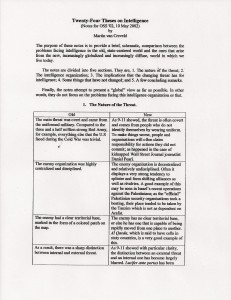 5 stars on its chosen focus, 4 for lack of larger context,
5 stars on its chosen focus, 4 for lack of larger context,
March 1, 2007
Martin van Creveld
Martin Van Crevald is one of a handful of military scholars without peer–others I hold is such regard include Colin Gray, Max Manwaring, Steve Metz, and Ralph Peters.
In relation to its chosen focus, the lessons of combat and the changing face of war, this is a capstone book unlike any other, and it will be a long-standing classic in the field, useful as both a primer for those new to the strategic study of war, and for those long in the tooth wishing to reflect back with what comprises a survey of both the literature and the century of war.
The conclusion is daunting. Like Will and Ariel Durant, and Clauswitz, the author concludes that the primary determinant of victory is not mass or technology, but rather the moral factor. Being “in the right,” being on one's home ground, being supported by many others because of solidarity in “being right,” is to money and technology and hubris at 10 to 1 if not 100 to 1.
The conclusion, and the work as a whole, are also slightly disappointing, not because of any imperfection in what is included, but because the book ends where I wished for it to begin. The author notes that asymmetric opponents can only be defeated by either deep precision intelligence that is by definition non-official in cover and native in capability; or pre-emptive attacks that nail all the key individuals early enough to prevent the insurgency from gaining momentum.
By choice, the author does not address the larger moral issues of global behavior, strategic budget priorities, international alliances, global labor standards, anti-corruption measures to prevent American elites from bribing foreign elites to loot their commonwealths for the benefit of the few and against the interests of the many, and so on. In short, this seminal work is out of today's context and does not address tomorrow's needs. Max Manwaring's The Search for Security: A U.S. Grand Strategy for the Twenty-First Century and Uncomfortable Wars Revisited (International and Security Affairs Series) as well as his “Environmental Security” are perhaps better foundations for future leaders contemplating the avoidance of war and the proliferation of peace. Colin Gray's point in Modern Strategy that time is the one thing we cannot replace nor buy, has been lost on the leaders from 1990 to date–we have wasted 50 years (see both The Fifty-Year Wound: How America's Cold War Victory Has Shaped Our World and The Unconquerable World: Power, Nonviolence, and the Will of the People and done terrible damage while wasting trillions.
This book is most valuable as the epitaph for the military-industrial complex in America, but sadly, this Administration not only does not get it, they are expanding the walking dead model into Homeland Security, with the full acquiescence of the largely witness Democratic majority in the House of the Representatives.
The movie War Games like Gandhi (Widescreen Two-Disc Special Edition), got it right. The only way to win a war in today's era is to not fight it at all. General Al Gray, USMC, then Commandant of the Marine Corps, got it right in 1988, writing in the American Intelligence Journal (Winter 1988-1989), about the need to focus on revolutionary and terrorist-spawning conditions, the urgency of funding “peaceful preventive measures,” and the importance of open source information.
Twenty years later, the Americans are giving lip service to “stabilization and reconstruction” while making a complete fiasco of both Afghanistan and Iraq. No less than $12 billion in cash courtesy of the Federal Reserve in New York, has gone missing from Iraq.
There are other works that I recommend in addition to this one. On the counter-insurgency side there is The Sling and the Stone: On War in the 21st Century as well as Learning to Eat Soup with a Knife: Counterinsurgency Lessons from Malaya and Vietnam; see also my varied lists including the asymmetric war list. At the higher level of making peace I recommend Ambassador Mark Palmer's superb Breaking the Real Axis of Evil: How to Oust the World's Last Dictators by 2025; Robert McNamara's DVD The Fog of War – Eleven Lessons from the Life of Robert S. McNamara as well as the DVD Why We Fight; and Blight & McNamara, Wilson's Ghost: Reducing the Risk of Conflict, Killing, and Catastrophe in the 21st Century as well as William Shawcross's Deliver Us from Evil: Peacekeepers, Warlords and a World of Endless Conflict. One last recommendation: Peacekeeping Intelligence: Emerging Concepts for the Future.
Brains, not bullets; belief systems, not weapons systems; are what the current and future conflicts are all about. America is way behind the power curve, and all current public intelligence indicators suggest that America will sink to British levels of non-influence, while Brazil, China, India, Indonesia, Iran, Russia, and Veneuzela–and some Wild Cards such as Malaysia, South Africa, and Turkey, “take off” and leave us behind.
Martin Van Crevald is the ultimate scribe of war, and he has closed the era of big war with this superb overview.
 Click Here to Vote on Review at Amazon,
Click Here to Vote on Review at Amazon,
on Cover Above to Buy or Read Other Reviews,
I Respond to Comments Here or There








